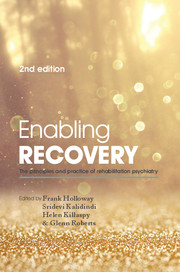Book contents
- Frontmatter
- Contents
- List of contributors
- List of figures, tables and boxes
- Preface
- Part 1 Setting the scene
- Part 2 Treatment approaches
- 7 Treatment approaches: overview
- 8 Rehabilitation at the coalface: practical approaches to helping people improve their functional skills
- 9 Cognitive approaches: cognitive–behavioural therapy and cognitive remediation therapy
- 10 Family interventions
- 11 Working with challenging behaviour
- 12 Working with coexisting substance misuse
- 13 Creative therapies and creativity
- 14 Management of medication when treatment is failing
- 15 Physical healthcare
- Part 3 Key elements of a rehabilitation service
- Part 4 Special topics in psychiatric rehabilitation
- Part 5 Future directions
- Index
15 - Physical healthcare
from Part 2 - Treatment approaches
Published online by Cambridge University Press: 02 January 2018
- Frontmatter
- Contents
- List of contributors
- List of figures, tables and boxes
- Preface
- Part 1 Setting the scene
- Part 2 Treatment approaches
- 7 Treatment approaches: overview
- 8 Rehabilitation at the coalface: practical approaches to helping people improve their functional skills
- 9 Cognitive approaches: cognitive–behavioural therapy and cognitive remediation therapy
- 10 Family interventions
- 11 Working with challenging behaviour
- 12 Working with coexisting substance misuse
- 13 Creative therapies and creativity
- 14 Management of medication when treatment is failing
- 15 Physical healthcare
- Part 3 Key elements of a rehabilitation service
- Part 4 Special topics in psychiatric rehabilitation
- Part 5 Future directions
- Index
Summary
Introduction
There are considerable inequities in physical health outcomes between individuals with severe enduring mental illness and the general population. These include a mortality rate of up to three times that of the general population (Laursen et al, 2007). This mortality gap, which translates to a life expectancy shortened by 15–30 years (Vreeland, 2007), has increased in recent decades, even in high-income countries with well-regarded healthcare systems providing universal care for the entire population (Ösby et al, 2000).
This chapter describes the factors responsible for premature mortality and some of the common physical health problems people with severe mental illness develop. Recovery and rehabilitation services, by their very nature, care for people at the severest end of the mental illness spectrum and are likely therefore to manage individuals with more challenging physical health needs, and symptoms that are barriers to healthy living. However, the recovery model also provides an opportunity to include physical health as a central tenet of the care provided.
The interplay between mental and physical health has received significant c overage inrecent years. It is at the core of the British government's mental health policy and is highlighted in reports by the Schizophrenia Commission (Schizophrenia Commission, 2012) and the Sainsbury Centre (Naylor et al, 2012). Within the UK, the National Health Service (NHS) has been given a clear mandate to tackle the long-standing and long-outdated disparity between mental and physical healthcare.
Mortality and morbidity statistics
Premature death in people with schizophrenia, bipolar disorder and other severe mental illnesses is a major concern. Results vary from study to study, but life expectancy could be reduced by as much as 30 years in this group. People with severe enduring mental illnesses are six to seven times more likely to die prematurely from physical illness than they are from suicide. The main cause of premature death is cardiovascular disease. People with severe mental illness under the age of 50 are three times more likely to die from a heart attack or stroke than the general population. Similarly, people aged 50–75 with a severe mental illness are twice as likely to die from cardiovascular disease (Osborn et al, 2007).
- Type
- Chapter
- Information
- Enabling Recovery , pp. 239 - 254Publisher: Royal College of PsychiatristsPrint publication year: 2015



